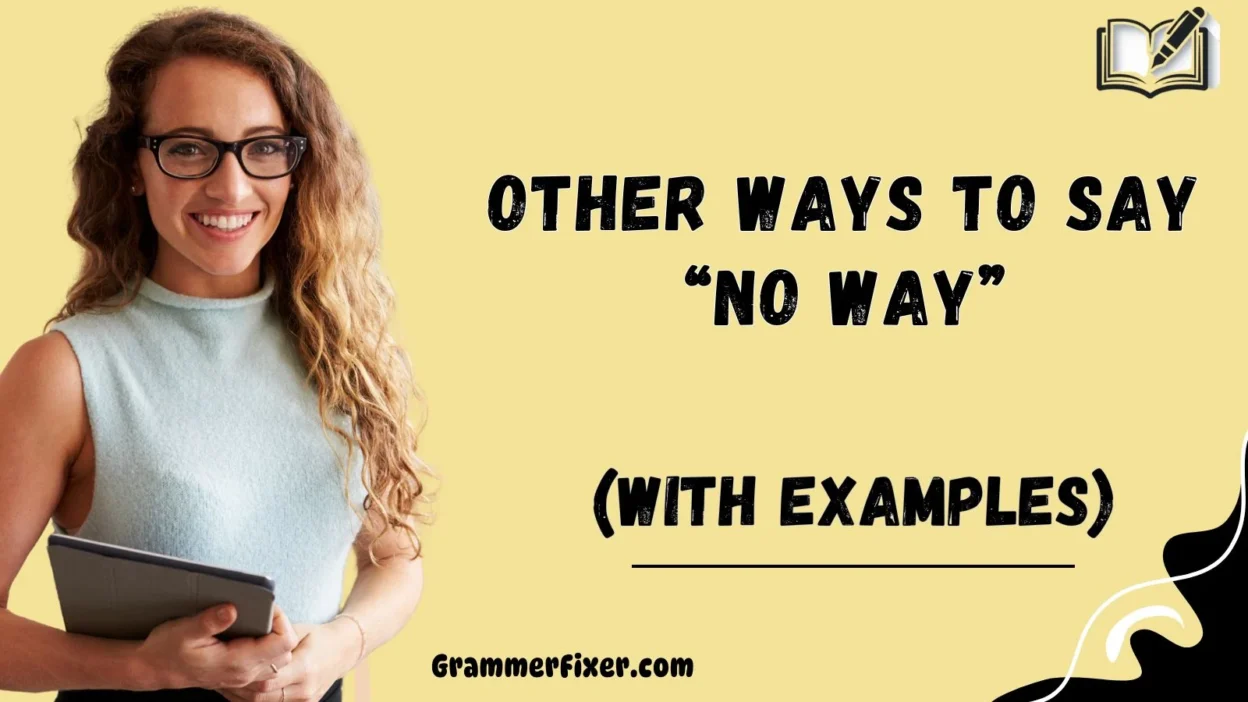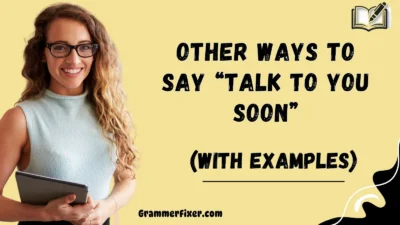Sometimes, finding the right words makes all the difference in how we connect with others. Saying “No Way” can sound fun, firm, dismissive, or even unprofessional—depending on the tone, setting, and relationship. By choosing alternatives that are thoughtful, warm, or tactful, you can express disbelief or disagreement while staying empathetic, clear, and respectful.
This guide will walk you through 30 different ways to say “No Way”, with explanations and examples to help you use them naturally in conversations with friends, family, colleagues, or even in professional settings.
What Does “No Way” Mean?
The phrase “No Way” is an idiomatic expression in English that communicates disbelief, strong refusal, or absolute rejection. Depending on tone, it can mean anything from “That’s unbelievable!” to “That’s absolutely not happening.”
When to Use “No Way”?
You can use “No Way” in many contexts:
- To express surprise or shock (“No way, really?”).
- To communicate firm refusal (“No way am I doing that”).
- To show skepticism or doubts (“No way that plan will work”).
- To emphasize boundaries and personal values (“No way, that’s not for me”).
Is It Professional/Polite to Say “No Way”?
In casual conversations with friends or family, “No Way” works perfectly. However, in professional environments, it may come across as too informal, dismissive, or abrupt. A more diplomatic, polite, or respectful alternative is often better in the workplace or formal settings.
Pros or Cons of Using “No Way”
Pros
- Short, natural, and emphatic in casual speech.
- Conveys conviction or disbelief instantly.
- Relatable and colorful among native speakers.
Cons
- Can sound rude or dismissive in professional contexts.
- May shut down discussion instead of encouraging dialogue.
- Tone can be misunderstood (playful vs. hostile).
1. Absolutely Not
Meaning: A firm, emphatic refusal.
Explanation: This phrase signals a definitive stance with no room for compromise.
Example: “Can we skip the safety checks?” — “Absolutely not.”
Best Use: Professional and serious contexts where safety, values, or commitments are at stake.
Worst Use: Casual chats with friends, where it may sound too harsh or cold.
Tone: Firm, authoritative.
2. Out of the Question
Meaning: Indicates something is impossible or unacceptable.
Explanation: Often used in workplace or formal settings to reject ideas politely but clearly.
Example: “Could we approve the budget increase this quarter?” — “That’s out of the question.”
Best Use: Business discussions, negotiations, or legal/ethical boundaries.
Worst Use: Lighthearted moments with friends, as it may come across as overly formal or stiff.
Tone: Professional, decisive.
3. Impossible
Meaning: Expresses total impossibility or disbelief.
Explanation: Strong but straightforward refusal that leaves no room for feasibility.
Example: “Can you finish the redesign today?” — “That’s impossible.”
Best Use: Work settings where practical limitations must be stated clearly.
Worst Use: Personal relationships, where it might sound discouraging or dismissive of someone’s hopes.
Tone: Serious, realistic.
4. No Chance
Meaning: Emphasizes that something has zero possibility.
Explanation: Friendly, light, and often used in casual speech.
Example: “Think you’ll try the new rollercoaster?” — “No chance.”
Best Use: Informal disbelief with friends, family, or peers.
Worst Use: Business settings or negotiations, where it may sound flippant or unprofessional.
Tone: Casual, playful.
5. Not Happening
Meaning: Direct refusal with finality.
Explanation: A blunt phrase that leaves no room for discussion.
Example: “Can we ignore the safety rules this time?” — “Not happening.”
Best Use: Personal boundaries, parenting, or strong informal refusals.
Worst Use: Workplace or diplomatic conversations, since it can sound too dismissive or confrontational.
Tone: Firm, informal.
6. Nope
Meaning: A short, casual way to say no.
Explanation: Informal, playful, and often used in friendly conversations.
Example: “Are you going to the late-night meeting?” — “Nope.”
Best Use: Light, casual chats with friends or family.
Worst Use: Professional settings, where it sounds too slangy and unprofessional.
Tone: Playful, informal.
7. Not a Chance
Meaning: Similar to “No chance,” but with an extra layer of emphasis.
Explanation: Works when you want to highlight disbelief or refusal strongly.
Example: “Will you eat that spicy chili?” — “Not a chance.”
Best Use: Informal settings, humorous refusals.
Worst Use: Formal discussions, since it can feel sarcastic or dismissive.
Tone: Emphatic, casual.
8. Never
Meaning: Complete refusal with finality.
Explanation: A strong way of expressing total rejection or impossibility.
Example: “Would you compromise your values for money?” — “Never.”
Best Use: Personal principles, values, and boundaries.
Worst Use: Workplace tasks, as it might seem too blunt or rigid.
Tone: Absolute, firm.
9. Forget It
Meaning: Tells someone that something is not worth pursuing.
Explanation: A dismissive phrase used in casual conversations.
Example: “Think you’ll lend him more money?” — “Forget it.”
Best Use: Informal chats where you want to cut off discussion quickly.
Worst Use: Formal settings, where it may appear rude or unprofessional.
Tone: Dismissive, casual.
10. Not in a Million Years
Meaning: Exaggerated refusal, stressing that something will never happen.
Explanation: A colorful, idiomatic way to emphasize disbelief.
Example: “Would you ever try skydiving?” — “Not in a million years.”
Best Use: Informal, humorous conversations with friends.
Worst Use: Workplace settings, where exaggeration may undermine seriousness.
Tone: Light-hearted, emphatic.
11. Negative
Meaning: A direct rejection, often used in military or technical language.
Explanation: Short, clear, and authoritative.
Example: “Do we have approval to move forward?” — “Negative.”
Best Use: Military, aviation, or emergency contexts.
Worst Use: Everyday friendly chats, where it sounds too cold or robotic.
Tone: Formal, authoritative.
12. Not a Possibility
Meaning: Indicates something is infeasible or unrealistic.
Explanation: A polite way to say something cannot be done.
Example: “Can we deliver the project in 24 hours?” — “That’s not a possibility.”
Best Use: Professional settings where feasibility needs to be explained.
Worst Use: Casual chats, where it may sound too formal or distant.
Tone: Professional, neutral.
13. Ain’t Happening
Meaning: A slangy, colloquial version of “Not happening.”
Explanation: Adds a casual, urban tone.
Example: “Think I’ll wake up at 5 a.m. on a Sunday? Ain’t happening.”
Best Use: Friendly, humorous, casual environments.
Worst Use: Workplace, where slang may sound unprofessional or careless.
Tone: Informal, slangy.
14. No Way in Hell
Meaning: A stronger, more colorful form of absolute refusal.
Explanation: Adds intensity and emphasis, often with emotion.
Example: “Would you bungee jump off that bridge?” — “No way in hell.”
Best Use: Strong informal refusal with close friends.
Worst Use: Professional or polite settings, where it can seem offensive or disrespectful.
Tone: Emphatic, intense.
15. Not Under Any Circumstances
Meaning: Firm rejection that stresses zero tolerance.
Explanation: Often used in professional, legal, or ethical contexts.
Example: “Can we release data without permission?” — “Not under any circumstances.”
Best Use: Workplaces, legal, or ethical boundaries.
Worst Use: Everyday friendly chats, where it may sound too formal and heavy-handed.
Tone: Serious, professional.
16. Not Possible
Meaning: A straightforward way of saying something cannot happen.
Explanation: Softer than “Impossible,” but still a clear refusal.
Example: “Can we finish this by tonight?” — “Sorry, that’s not possible.”
Best Use: Professional conversations where you need to be polite yet firm.
Worst Use: Casual jokes with friends, where it may sound too stiff or formal.
Tone: Respectful, professional.
17. By No Means
Meaning: Emphatic denial, stressing that something is completely unacceptable.
Explanation: Often used in formal English to sound polished and definitive.
Example: “Could we cut corners on safety?” — “By no means.”
Best Use: Formal settings, professional discussions, or academic writing.
Worst Use: Everyday chats, where it may come across as old-fashioned or overly formal.
Tone: Polite, formal.
18. Not a Hope
Meaning: Expresses that there’s no chance of success.
Explanation: Similar to “No chance,” but carries a slightly lighter, British flavor.
Example: “Think we’ll win the lottery this week?” — “Not a hope.”
Best Use: Informal, playful conversations.
Worst Use: Business meetings, where it may sound too flippant or unserious.
Tone: Light, casual.
19. Never Ever
Meaning: Stronger version of “Never,” stressing absolute refusal.
Explanation: Adds emotional weight and finality.
Example: “Would you betray your best friend?” — “Never ever.”
Best Use: Personal boundaries, strong emotional situations.
Worst Use: Workplace, where it can sound childish or overly dramatic.
Tone: Emotional, emphatic.
20. Over My Dead Body
Meaning: A colorful, emphatic way of saying “Absolutely not.”
Explanation: Conveys that you would never allow something to happen.
Example: “Can we sell the family home?” — “Over my dead body.”
Best Use: Informal settings with strong personal emotions.
Worst Use: Professional or diplomatic situations, where it may sound aggressive or confrontational.
Tone: Dramatic, passionate.
21. Not at All
Meaning: Indicates total refusal or dismissal of an idea.
Explanation: Can be used politely but still firmly denies possibility.
Example: “Do you think that rumor is true?” — “Not at all.”
Best Use: Casual or professional settings where you want to be polite.
Worst Use: Strong boundary-setting moments, since it may sound too soft or indirect.
Tone: Polite, calm.
22. Not in This Lifetime
Meaning: Stresses that something will never happen, ever.
Explanation: A dramatic phrase with a mix of humor and finality.
Example: “Would you climb Mount Everest?” — “Not in this lifetime.”
Best Use: Casual, humorous disbelief.
Worst Use: Work discussions, where it can sound sarcastic or unprofessional.
Tone: Light, dramatic.
23. Not for Me
Meaning: A gentle refusal that shows personal preference.
Explanation: Less harsh than “No way,” and polite in tone.
Example: “Want to try this extreme workout?” — “Thanks, but it’s not for me.”
Best Use: Casual conversations, polite rejections.
Worst Use: When absolute seriousness is required (legal, safety, medical), since it may sound too soft.
Tone: Gentle, respectful.
24. I Refuse
Meaning: A clear, strong declaration of personal rejection.
Explanation: Signals firm autonomy and conviction.
Example: “Will you break your promise?” — “I refuse.”
Best Use: Situations where values, commitments, or safety are at risk.
Worst Use: Everyday casual chats, as it may sound too dramatic or confrontational.
Tone: Serious, firm.
25. Not Acceptable
Meaning: States that something is against standards, rules, or values.
Explanation: Often used in professional or disciplinary settings.
Example: “The engineer skipped the safety checks.” — “That’s not acceptable.”
Best Use: Workplace, safety, ethics, or parenting.
Worst Use: Casual conversations, where it may feel too stern or formal.
Tone: Professional, authoritative.
26. Out of the Realm of Possibility
Meaning: Suggests that something is beyond feasibility.
Explanation: A more formal, intellectual way of saying “No way.”
Example: “Can we build the project in two days?” — “That’s out of the realm of possibility.”
Best Use: Professional or technical discussions where feasibility must be explained.
Worst Use: Everyday casual chats, where it may sound pretentious or overly academic.
Tone: Formal, thoughtful.
27. Fat Chance
Meaning: A sarcastic way of saying something has no chance.
Explanation: Colloquial, often playful, but can be cutting depending on tone.
Example: “Think they’ll invite us to the VIP section?” — “Fat chance.”
Best Use: Casual conversations with friends who understand your humor.
Worst Use: Professional or sensitive conversations, where sarcasm may be taken as rude or mocking.
Tone: Sarcastic, humorous.
28. Not Going to Happen
Meaning: A direct and definitive refusal.
Explanation: Leaves no room for negotiation.
Example: “Can we double the budget without approval?” — “Not going to happen.”
Best Use: Casual refusals, strong boundaries.
Worst Use: Formal workplace contexts, where it may sound too dismissive.
Tone: Firm, blunt.
29. Don’t Count on It
Meaning: Suggests that something is very unlikely or unrealistic.
Explanation: Expresses doubt or skepticism without being too harsh.
Example: “Do you think the weather will stay sunny all week?” — “Don’t count on it.”
Best Use: Casual settings with friends or family.
Worst Use: Professional situations where optimism and encouragement are needed; can sound pessimistic.
Tone: Doubtful, conversational.
30. Not a Viable Option
Meaning: Indicates that something is infeasible or impractical.
Explanation: A professional way to dismiss a plan or suggestion.
Example: “Should we cut safety training to save costs?” — “That’s not a viable option.”
Best Use: Workplace, strategic planning, management discussions.
Worst Use: Informal chats, where it may sound too technical or rigid.
Tone: Professional, analytical.
Conclusion
The phrase “No Way” can express disbelief, rejection, or strong refusal, but the way you say it makes all the difference. Choosing the right alternative allows you to stay polite, professional, or playful, depending on the situation. Some options feel perfect in casual conversations with friends and family, while others work better in formal or workplace settings where tact matters.
Each phrase carries its own tone and personality — from firm and serious to lighthearted and humorous — and using them thoughtfully helps you set clear boundaries without sounding harsh. By picking the right words, you show not just your stance but also empathy, warmth, and respect, keeping communication effective and relationships positive.



